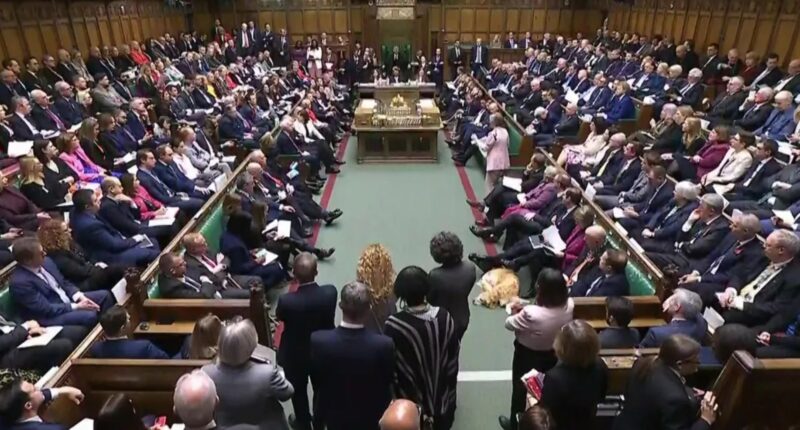There are groundbreaking assisted dying laws that have been passed by MPs in a close final vote, giving terminally ill adults the legal right to end their lives.
The decision paves the way for the biggest shake-up in end-of-life care in decades after weeks of furious lobbying on both sides.




The Bill now moves to the House of Lords for further scrutiny before it can become law.
Overall, there were 314 votes for the bill compared to 291 against, giving a majority of 23 in favour of the legislation.
Votes in favour included Prime Minister Sir Keir Starmer while Tory leader Kemi Badenoch voted against.
Under these laws, adults in England and Wales who have less than six months to live can request a medically assisted death, with stringent safeguards in place.
What Happens Next?
– With the Commons backing the Bill, it now moves to the House of Lords for detailed debate and scrutiny.
– Peers can suggest amendments, which would send the Bill back to the Commons — a process known as “ping pong”.
– But because this is a major conscience issue, the unelected Lords are unlikely to block it outright after it passed the elected House.
– Supporters hope it will win final approval and receive Royal Assent by October, officially becoming law.
– A four-year implementation period will follow, allowing time to establish the new system, including expert panels and regulatory safeguards.
The passing of the bill follows a wave of backing, which includes support from figures like 84-year-old TV personality Dame Esther Rantzen, who is fighting stage four lung cancer, and 52-year-old terminally ill Sophie Blake.
Dame Esther said the terminally ill are “truly voiceless” and face an “agonising death” – adding: “This is a crucial debate for the truly voiceless.”
She went on to say: “They are the terminally ill adults for whom life has become unbearable and who need assistance, not to shorten their lives but to shorten an agonising death – and their loved ones who under the current law will be accused of committing a crime if they try to assist or even stay alongside to say goodbye.”
Sophie said: “This is not about wanting to die, but to be able to live the rest of my life with the peace and comfort of having choice.
“I have come to terms with the fact that my life has been shortened, and I do not fear death, but I do fear how I’ll die.”
However, critics of the bill have argued that it could encourage patients to end their own life prematurely, rather than continue to receive care.
THE Assisted Dying Bill is one step closer to becoming law, meaning terminally ill adults are set to be given the legal right to end their lives.
But the Bill – which has undergone significant changes at each stage – doesn’t come without strict safeguards.
Many things have been stripped out, so what remains?
APPROVAL FROM DOCTORS AND AN EXPERT PANEL
When the Bill was originally proposed, it was planned that a High Court judge would have the final say in each and every case.
It comes after Labour’s Kim Leadbeater had dismissed warnings that judges couldn’t handle the cases due to scarce capacity, insisting her Bill would be the “most robust” in the world.
But Ms Leadbeater amended her legislation.
The last-minute tweak, proposed just hours before MPs began debating the Bill in February, sparked a backlash — throwing its future into doubt and turning former supporters cold.
However, applications will now need the approval of two doctors and a new expert panel.
This will be made up of a legal figure, psychiatrist and social worker — a key change from the original plan.
EATING DISORDERS
MPs accepted an amendment ruling out eligibility for anyone seeking to die solely due to stopping eating or drinking.
Ms Leadbeater stressed the Bill would exclude those with eating disorders.
It followed concern over the wording of the potential law would provide a loophole for those with anorexia to end their own lives.
The Liberal Democrat MP Sarah Olne tabled the amendment.
The Royal College of Psychiatrists also expressed concern over any people with mental disorders such as anxiety or depression using the Bill in a similar way.
END-OF-LIFE CARE
Another amendment requiring ministers to assess the impact on palliative care within a year also passed.
Charity Marie Curie warning this alone would not “make the improvements needed” in end-of-life care.
REFLECTION PERIOD
Some parts of the Bill have stayed the same, however.
Two doctors must be independently satisfied a person is eligible for assisted dying.
The medics must do their assessments at least seven days apart.
There must be a 14-day “reflection period” if the High Court decides the patient can undergo assisted dying.
If the two doctors are still satisfied once the period has been completed, the patients will be prescribed lethal drugs.
THE PAPERWORK
Brits who want to end their lives early must show have the mental capacity to make a choice about ending their life.
They must also be deemed to have expressed a clear, settled and informed wish, free from coercion or pressure.
If the patient can prove this, they will then have to make two separate declarations, witnessed and signed, saying they want to die.
WHAT IS IN THE BILL?
The Terminally Ill Adults (End of Life) Bill applies to those over 18, who are living in England or Wales, and have been registered with a GP for at least 12 months.
They must have the mental capacity to make the choice.
They must be informed and free from coercion or pressure before making the choice.
According to the Bill, they must have a terminal illness and be expected to die within six months.
It requires them to declare their wish twice, both witnessed and signed.
Two doctors must be satisfied that these requirements are met before the application is approved.
A doctor would prepare the substance being used to end the patient’s life, but the person would take it themselves.
Coercing someone into declaring they want to end their life will be illegal, with a possible 14-year prison sentence.
They added that disabled and older people could be at risk of being coerced, directly or indirectly, into ending their lives to save money or relieve the burden on family members.
Some have also called for improvements in palliative care and greater investments in hospices to ease suffering as a better and more moral alternative.
Speaking in the Commons today, veteran Labour MP Diane Abbott asked: “What could be more unjust than to lose your life because of poorly drafted legislation?”
Opening the debate in the House earlier, Labour’s Kim Leadbeater – who brought forward the bill – highlighted how she had heard hundreds of stories from people who had seen their loved ones die in traumatic circumstances.
She said: “Not supporting the bill today is not a neutral act. It is a vote for the status quo.
“And it fills me with despair to think MPs could be here in another 10 years time hearing the same stories.”
‘Correct the profound injustices’
Ms Leadbeater called the bill a “compassionate and safe choice” and said it would “correct the profound injustices of the status quo”.
The new law means adults in England and Wales with fewer than six months to live will be allowed to apply for a medically assisted death, under strict safeguards.
Applications will need the approval of two doctors and a new expert panel made up of a legal figure, psychiatrist and social worker — a key change from the original plan which required sign-off from a High Court judge.
The final vote passed after fierce debate and a string of last-minute amendments.
Conservative MP Sir James Cleverly, opposing the move, pushed back on claims it was now or never, telling MPs: “There will be plenty of opportunities.”
Other opponents to the law included former prime ministers Boris Johnson, Theresa May, Liz Truss, and Gordon Brown.
Labour big beast Lord Maurice Glasman also slammed the bill, saying he “loathed” the attempt to “give incentives to old people to die so that their children can get their hands on the house and some money.”
In comments to The Sun, Lord Glasman said: “No parent wants to be a ‘burden’ on their children, and times are hard.



“This Bill is not only – and pardon my expression – an abortion in its messy confusion, it is also the opposite of what this Government should be supporting.
“We should love and cherish our old people, support families taking care of their parents and grandparents by supporting and subsidising the building of granny flats.”
MPs accepted an amendment ruling out eligibility for anyone seeking to die solely due to stopping eating or drinking — with Ms Leadbeater stressing it would exclude those with eating disorders.
Another amendment requiring ministers to assess the impact on palliative care within a year also passed, with charity Marie Curie warning this alone would not “make the improvements needed” in end-of-life care.
Campaigners on both sides gathered outside Parliament, with signs reading “Let us choose” and “Don’t make doctors killers”.
Polling published ahead of the vote showed 73 per cent of Brits still support legalising assisted dying – the same figure as in November’s second reading.











![Anne Burrell: Food Network Chef Found Dead Near Dozens of Pills [Report]](https://bbcgossip.com/wp-content/uploads/2025/06/Anne-Burrell-Food-Network-Chef-Found-Dead-Near-Dozens-of-380x200.jpg)






